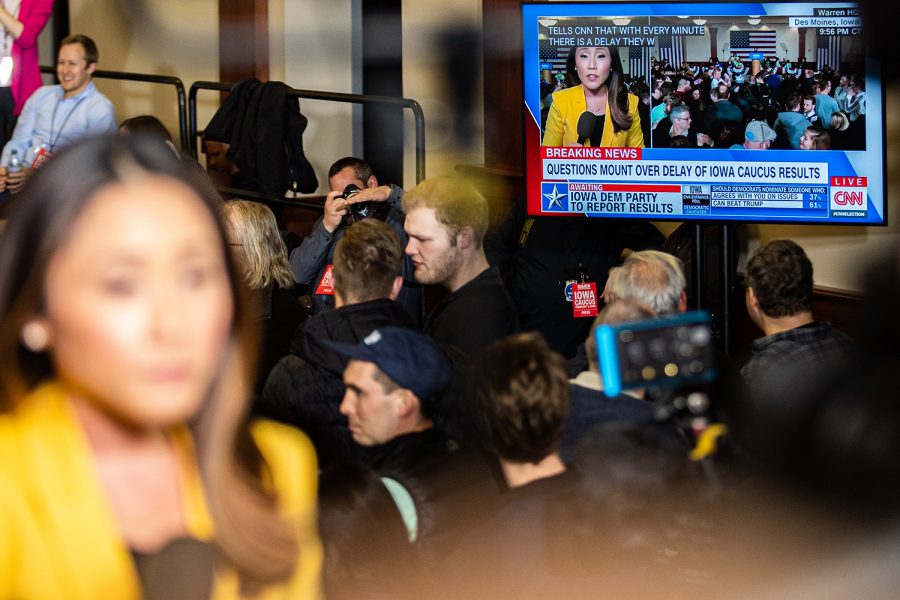Opinion | Iowans are politically passionate, but that’s not enough to justify our first in the nation status
Between the caucus system and Iowa’s demographics, the argument to keep our first-in-the-nation status is quickly diminishing.
CNN anchor Amara Walker reports from Warren HQ at the Forte Banquet and Conference Center in Des Moines on Monday, Feb. 3, 2020.
March 22, 2021
As a native Iowan, I don’t want to admit it. I tried for the longest time to justify Iowa’s first in the nation status during presidential campaigns. Setting my Iowa biases aside, I’ll finally concede. Iowa doesn’t deserve to be the first state in the presidential nomination calendar anymore.
Iowa became the first test for presidential candidates in the early 70s. Candidates spend ample time, money, and resources campaigning in the Hawkeye State because the results from Iowa have national implications. A shoddy showing in Iowa could doom a presidential hopeful immediately, while a win could catapult an underdog to frontrunner status.
The state’s initial importance comes from its status as first contest holder in presidential primary season, but another point of interest is Iowa’s caucus system.
It seems normal to Iowans. Why wouldn’t we go stand in a crowded room to discuss and declare our respective votes for the presidential nomination? I certainly share the sentiment that the caucuses are unique to Iowa and meaningful to the state’s electorate. Gathering to talk politics with neighbors every four years is a highly anticipated tradition in Iowa.
Though many Iowans cherish our first-in-the-nation caucuses, onlookers from other states are quick to question our political capabilities. Political operatives on the national scene argue two rationales against awarding Iowa first-in-the-nation status, starting with the caucuses.
The caucuses are inherently complicated, compared to a regular individual ballot vote primary. Caucuses are logistically exclusive because they are time consuming and occur on a weekday night, which results in predictably low turnout.
Don’t take my word for it, ask Colorado. The state saw 122,000 caucus attendees in 2016. But just four years later, over 755,000 Coloradans voted in the state’s newly adopted primary system.
As for Iowa’s turnout, only 176,000 Iowans participated in the 2020 caucus, a number slightly higher than 2016. About 1.65 million Iowans voted in the 2020 general election, meaning about 1 in 10 general election voters attended a caucus.
Unfortunately for Iowa, low turnout wasn’t the primary issue with the 2020 caucuses. Type “Iowa caucus 2020,” into Google. There’s a reason that “Iowa caucus 2020 disaster,” is the third search suggestion.
The debacle started with a coding failure that made initial results inaccurate and sporadic, and the final tally wasn’t released until days later. Pete Buttigieg and Bernie Sanders both claimed victory before the process was finalized, but the results really didn’t matter. In the aftermath, Iowa’s status as a leader in our political process was heavily lambasted, and rightfully so.
Before the results were even finalized, national media was inundated with further criticism of the state. Iowa insists on both maintaining its political prevalence as the first contest and conducting the antiquated caucus process. If Iowa is unable to smoothly conduct such an important contest, there’s little argument to be made that we deserve the top spot.
Looking past low turnout and the caucus catastrophe, let’s consider the state’s demographics. Since Iowa is 90 percent white, how can it be representative of the nation as a whole? Can our lack of diversity accurately reflect the preferences of the entire country?
Our process is complex, exclusive, and even unfunctional. Demographically, we don’t reflect an accurate picture of the nation. Providing Iowa with the first slot in the primary season has positive financial implications for the state, but at what cost to our political processes? It hurts to admit, but we don’t deserve to influence future presidential campaigns as we have in the past.
Columns reflect the opinions of the authors and are not necessarily those of the Editorial Board, The Daily Iowan, or other organizations in which the author may be involved.



